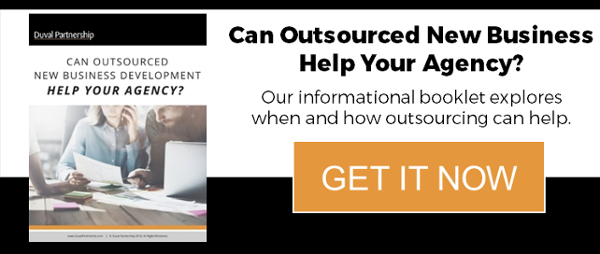The other day I was asked by a prospective client to join a conference call with one of their prospects. I thought it would be a good opportunity to learn how they present their agency.

They are a mid-sized agency with good work in their portfolio across some solid categories. They have a nice client mix; including some regional, some national, and even a global account which they service in partnership with a few other agencies. The team is strong, including a mix of seasoned professionals, young talent, and good experience. Plus, they are likable. I like them, and I can’t always say that about a prospective client.
Needless to say, I was excited to sit in on the call. I was curious whether they would fall into the trap of pounding on their chests for an hour or make it more client-centric.
Your Meeting Habits Are Low-Hanging Fruit
My quick thoughts during the call were that they did some things well but also displayed a few bad habits. Which is great, because it means there is room for improvement. Bad habits on phone calls can be easily fixed, potentially yielding better results relatively quickly.
I noticed that they came to the meeting well prepared, but then spent a little too much time offering opinions, or what seemed like opinions. I always say there is a fine line between insights and observations. Observations packed up as insights often fall short of their mark. This was a fairly big fail on their part. Unfortunately, they had some good work experience in the prospect’s industry, but they didn’t go deep enough to truly demonstrate it.
I know I may piss off a few creatives, but we live in an age where good creative is table stakes. There needs to be more “there” there. Observations are ideally focused on what is meaningful, substantive, and potentially actionable. Not tangential. And a few meaty observations are worth more than many superficial ones.
Three Golden Rules of Great Pitches and Meetings
There are many aspects which can make a great agency prospect meeting, but I think if you always remember these three things going in, you can make the most of it.
1. Talk less. Salespeople or agency pitch teams tend to do 70% of the talking when they should be speaking only 30% of the time. The only way to avoid this is to approach the meeting as a diagnostic quest instead of an opportunity to showcase your work and your thinking. You should also be armed with an effective questioning strategy. One good word to remember to ask often is “Why?” Why did that happen? Why now? Why us?
2. If the client puts you on mute, you are speaking too much. We have all been there, on a conference call, while we are going on and on and then we feel we are speaking to an empty room on the other side. So we think of some unfortunate question like, “Do you have any questions at this time?” Or, “Does this make sense?” I would strongly suggest you refrain from asking those type of questions.
Back to my original point, if you are on a conference call and the client can put you on mute to talk amongst themselves...or, more likely, do something else rather than be engaged in the call, then you have lost them, and they aren’t coming back. If you have a plan going in—and you should—please make sure that engaging the prospect in the conversation (instead of delivering a monologue) is part of it.
3. Have a plan. Agencies are often so happy to have the call or meeting that they don’t think about the next steps. I see so many agencies hang up the phone or walk out of a meeting without clearly defined next steps and agreement on who will be doing what. Many are fearful of being too pushy and don’t want to turn the client off.
The reality is that it took you four months to get in touch and set the meeting. They are busy; use that to your advantage. A simple, “I know you are extremely busy, and I appreciate your time. Can we put a time on the books to follow up with the materials you requested?” Break out your phones, daily calendars, whatever you have and lock them down with a date and time. And immediately follow up with a meeting invite.
In the event they actually want a proposal from you (let’s assume there is a real opportunity) don’t just send it to them. Instead, set up a call, send a WebEx invite or Join.me link to a meeting and walk them through the proposal. Do not send it beforehand. You should control the proposal, not them.
To reiterate, the three golden rules for your next prospect meeting are basically these:
- Have a Plan
- Don’t Talk Too Much
- Have a Plan to Not Talk Too Much
If you incorporate these three simple things in your meetings moving forward, you will find that less time is wasted chasing bad clients and you will be closer to getting an answer. Even a “no” is a good thing, as it will keep you from pursuing an opportunity that has little to no chance of evolving into a client.
Ready to grow your agency?
You may also be interested in:
- Why is "No" the 2nd Best Word in Sales?
- The Benefits of Having a Sales Process: New Business
- Agency Sales Tip: Talk Less, Sell More
Image credit: © iStockphoto.com / Antonio_Diaz



